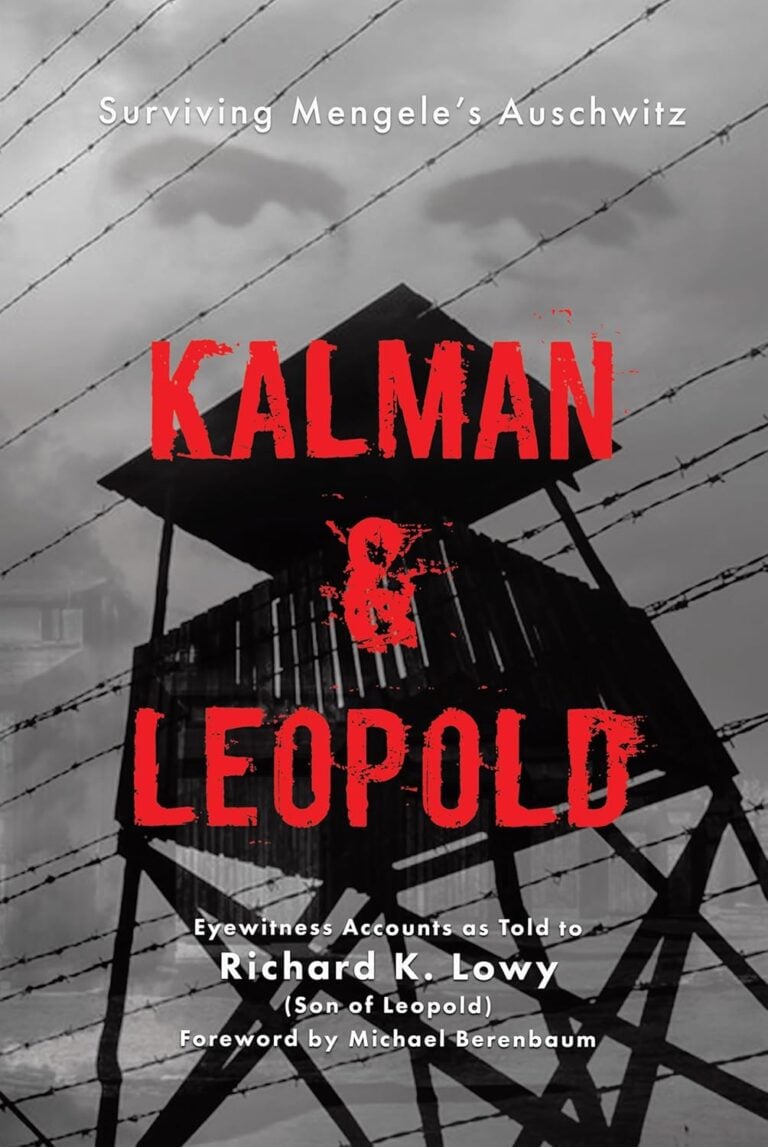
Following find an interview with author Richard K. Lowy.
What is the name of the book and when was it published?
The book is Kalman & Leopold – Surviving Mengele’s Auschwitz, published on January 14, 2025.
What’s the book’s first line?
“This is part of the strange generation of ours.
What’s the book about? Give us the “pitch”.
Kalman & Leopold – Surviving Mengele’s Auschwitz is the extraordinary true story of two young boys—Kalman and Leopold—who endured the unimaginable horrors of Auschwitz, including brutal experiments under the infamous Dr. Josef Mengele. Leopold’s strength became Kalman’s lifeline, and through a bond forged in terror, they defied all odds to survive. What sets this book apart is its unprecedented perspective: for the first time, eyewitness testimony emerges from inside a guard shack at Auschwitz-Birkenau—specifically, the shack stationed at Mengele’s own hospital camp. This chilling vantage point, never before documented in Holocaust literature, adds a harrowing layer of immediacy and truth to their story. Told through their own words—raw, unfiltered, and deeply human—and supported by an evocative intimate narrative, Kalman & Leopold traces their journey from unthinkable trauma to a miraculous reunion 56 years later. This is more than a Holocaust memoir—it’s a testament to resilience, brotherhood, and the will to live.
What inspired you to write the book? A particular person? An event?
The book was inspired by my father’s journey and his remarkable bond with Kalman, the boy he protected in Auschwitz. Their reunion, nearly six decades later, was the emotional spark that compelled me to capture and preserve their story.
What’s the main reason someone should really read this book?
Because this story is not just history—it’s humanity at its most raw and resilient. It offers an unfiltered view into the Holocaust through the eyes of children, and through their courage, it reminds us of the power of connection, even in the darkest moments. It’s deeply emotional, true, and unforgettable.
What’s the most distinctive thing about the main character? Who—real or fictional—would you say the character reminds you of?
Though this is nonfiction, Leopold—my father—emerges as a real-life protector. As a young boy, he made the decision to care for Kalman, despite the risks. His resilience and sense of purpose were his defining traits. He reminds me of a young Atticus Finch, if Atticus had been forced to survive a death camp with nothing but his wits and his heart.
When did you first decide to become an author?
I never set out to be an author. This story found me. Once I realized the historical and emotional significance of what my father and Kalman had survived, I knew I had a responsibility to write it.
Is this the first book you’ve written?
Yes, though I come from a creative background, this is my first published book. It took five and a half years to complete.
What do you do for work when you’re not writing?
I’m a producer and creative director in the event industry, known for designing immersive experiences. Storytelling is central to everything I do, whether it’s through a live event or the written word.
How much time do you generally spend on your writing?
This project was all-consuming at times. I would often spend late nights fact-checking testimony, crafting the narrative, and making sure every word honored the truth. The story demanded that kind of attention.
What’s the best and the hardest part of being an indie?
The best part is creative control—you get to ensure your voice isn’t compromised. The hardest part is everything else—distribution, promotion, finding your audience. But when it connects, it’s deeply rewarding.
What’s a great piece of advice that you can share with fellow indie authors?
Don’t rush. Respect the time it takes to get the story right. And find collaborators who believe in your vision as much as you do.
Would you go traditional if a publisher came calling? If so, why?
Absolutely. If the right publisher came along who understood the heart of this story and could help bring it to a wider audience, I’d welcome it. This story belongs in classrooms, libraries, and in the hands of readers everywhere.
Is there something in particular that motivates you (fame? fortune?)
Legacy. This story preserves something sacred. My motivation is ensuring Kalman and Leopold’s story lives long after all of us are gone.
Which writer, living or dead, do you most admire?
Elie Wiesel. His ability to write with quiet force and unflinching truth set the standard for Holocaust memoirs.
Which book do you wish you could have written?
Man’s Search for Meaning by Viktor E. Frankl. It combines personal survival with profound psychological insight, which is something I strived for in Kalman & Leopold.
